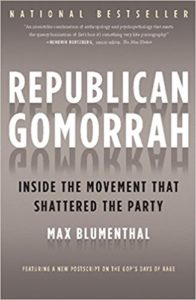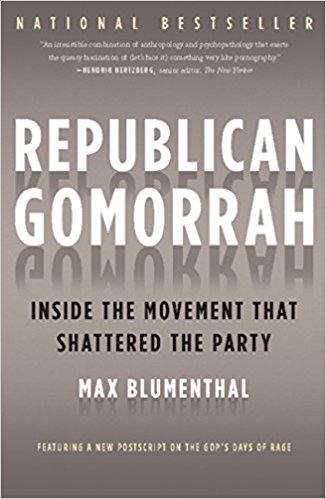
Not a day goes by that national news reports don’t prominently feature the Tea Party, the creation of former Republican Congressional leader Dick Armey and the wealthy Right-Wing donors behind him. Those of us who disagree with the fundamental tenets of this made-to-order “grassroots movement” of American conservatives — and that’s a huge majority of the American people — tend to gnash our teeth, roll our eyes, and perform other uncomfortable physical acts whenever we learn about some new outrage from this motley collection of dopes and lunatics.
Estimated reading time: 3 minutes
It wasn’t always so, though. Remember the “Religious Right?”
Barely two years ago a young, award-winning journalist and blogger named Max Blumenthal — son of Sidney Blumenthal, late of the Clinton White House — published an examination of this earlier incarnation of Republican extremism. His book, Republican Gomorra, was a New York Times bestseller and was warmly welcomed by readers who had scratched their heads in consternation over the peculiar beliefs and irrational antics of this seemingly all-powerful movement as it moved to gain dominance in the Republican Party. Blumenthal’s psychosocial analysis, grounded in the work of Erich Fromm, delves deeply into the psyches of many of the movement’s leaders, most notably James Dobson of Focus on the Family and Rick Warren (yes, the Rick Warren who gave the invocation at Barack Obama’s inauguration).
Republican Gomorra: Inside the Movement That Shattered the Party by Max Blumenthal (2009) 418 pages ★★★★☆
Now, don’t make the mistake of confusing the Religious Right with the Tea Party, which are uncomfortable bedfellows and mutually inconsistent in many key ways. For example, it was Dobson and his allies who were behind the ouster of Dick Armey from his leadership post on Capitol Hill, finding that the Congressman, whose priorities revolve around federal spending, was not sufficiently supportive of the social agenda of the Religious Right. American conservatives are a diverse lot.
Blumenthal, bowing to Erich Fromm, likens the Religious Right to the authoritarian movements that seized control in Europe in the 1920s and 1930s. Dissecting the ideology and public practices of this allegedly “Christian” movement (which is hardly Christian in any meaningful way, so far as I can see), Blumenthal finds that its beliefs boil down to beating children into submission when young so that they will be obedient followers of the movement’s father figures as they get older. Not surprisingly, as Fromm so convincingly showed, this practice leads to numerous pathologies. It helps to explain why the Republican Party has been upended by so many lurid sex scandals in recent years. And if you think for one minute that this analysis is exaggerated, check out Dobson’s books (Dare to Discipline, The Strong-Willed Child).
This is a lively and fascinating book based on five years of interviews with the luminaries of the Religious Right, and it’s worth reading today despite the fact that its narrative ends with the election of Barack Obama. The Religious Right may no longer hog the headlines, but there’s no mistaking its continuing hold on so many of the levers of power.
For additional reading
For more books like this one, check out Top 10 nonfiction books about politics. This one is on the list.
You may enjoy browsing through 20 top nonfiction books about history.
If you enjoy reading history in fictional form, check out 20 most enlightening historical novels.
For more good books on the history of the US, see Top 20 popular books for understanding American history.
And you can always find my most popular reviews, and the most recent ones, plus a guide to this whole site, on the Home Page.


























